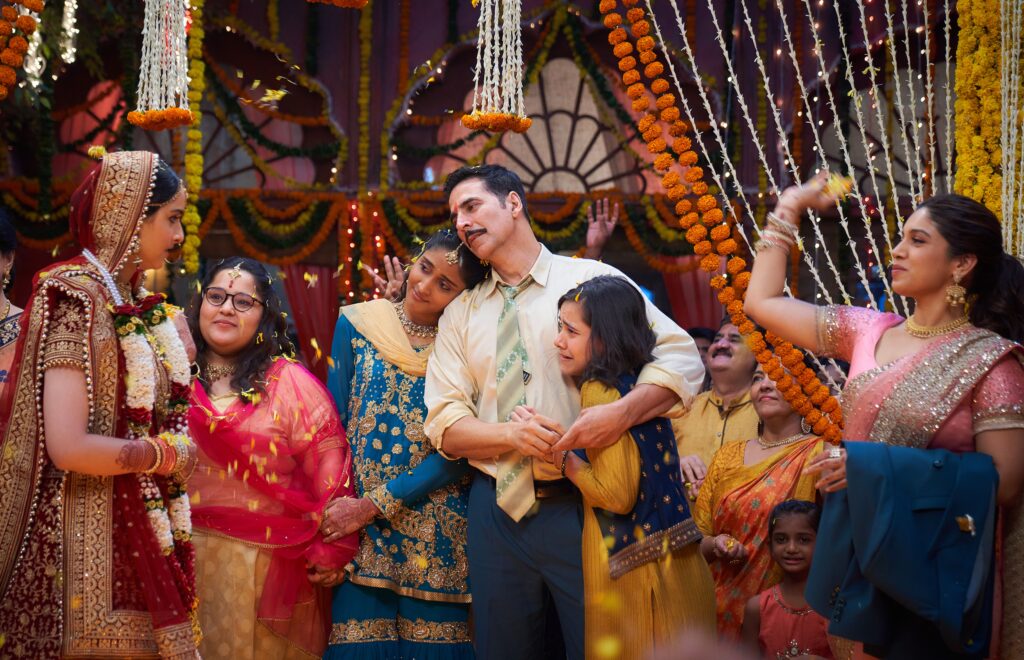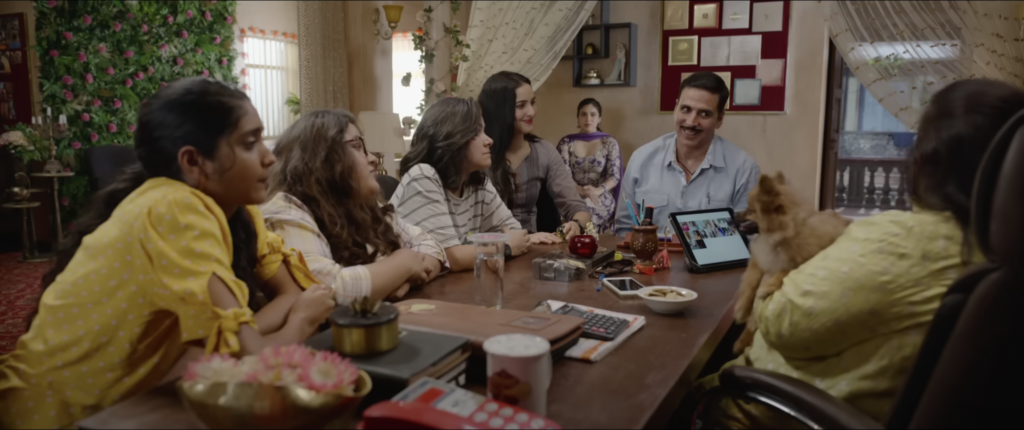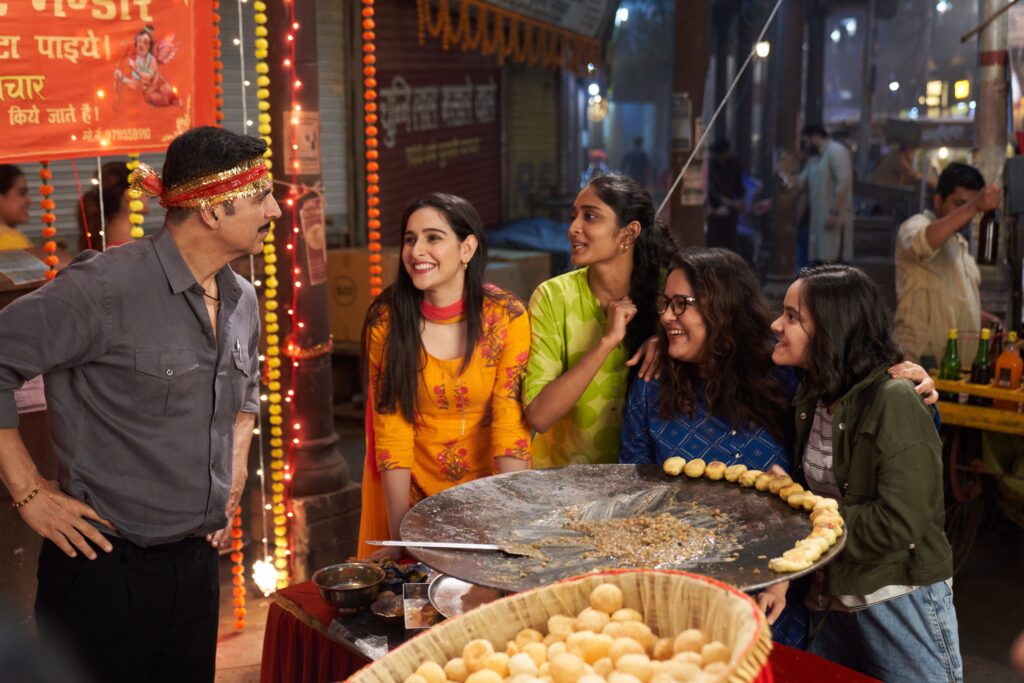After watching the trailer (which, these days, gives away almost 80% of the story)of Raksha Bandhan, I had my reservations about the film and the potential problematic dialogue it seemed to be highlighting.
But the conversations across the web were too positive for me to ignore and I questioned myself for misunderstanding it. So, I rewatched the trailer with an open mind and convinced myself that there ought to be more than meets the eye.
And after the watching the film now, it’s safe to say that my initial doubts and assumptions were in fact accurate.
Raksha Bandhan revolves around Lala Kedarnath (Akshay Kumar), a brother of four “unmarried” sisters living in Chandni Chowk, Delhi. His life’s only mission is to save a huge sum of dowry to successfully get his sisters married off as soon as possible.
At the surface of it, the obvious problem of dowry and elaborate wedding culture can be argued as hugely problematic. But writers Kanika Dhillon and Himanshu Sharma have smartly (or shall I say conveniently) added the layer of “maa ki aakhri ichha” (mother’s dying wish) to justify his urgency to achieve his goal – a promise made to his mother on her deathbed, Lala swore to stay unmarried till he marries the sisters’ off.
Enter Sapna (Bhumi Pednekar), who’s been keen on marrying him for as long as she can remember and is eagerly waiting for Lala to accomplish his goal.
Thus follows the protagonist’s quest to hunt for husbands for all four sisters.
The sisters, Gayatri (Sadia Khateeb), Durga (Deepika Khanna), Laxmi (Smrithi Srikanth), and Sarawasti (Sahejmeen Kaur) come is all forms, colors and sizes.
You read that right; And it is unapologetically emphasized throughout the film till you squirm in your seats.

Still from Raksha BandhanWhile one sister is the quintessential “good” girl with beautiful features, well-behaved, and homely and feminine in equal measure, the other three offer a variety termed “not marriageable”.
No points for guessing the problems underlined for each of the sister. The overweight sister is constantly seen eating and is expected to lose weight, the dark-skinned sister is encouraged to use skin-lightening products and avoid the sun, and the tomboyish sister is advised to be more “feminine” by practicing domestic chores.
And the problem doesn’t end there.
Sapna too is shown lacking any sense of individuality wherein her father cannot bear to keep an “unmarried daughter” any longer and is willing to get hitched to any Tom, Dick and Harry instead of waiting for Lala. He also has no qualms about paying a hefty dowry for the sake of fulfilling his duties.
The above is not a spoiler. It’s pretty evident in the trailer itself.
All women are used as mere props in the film, being shoved and pushed to mindlessly follow what they’re told by the men in their lives.
Just when you think it can’t get any worse, the film proves you wrong.
The problem isn’t the subject, but the authority with which the narrative influences appalling judgements and mindset on a mainstream platform.
The arguments for and/or against dowry, the need for a son in families, marriage being a woman’s only goal and purpose in life, and even disabilities being the cause for rejection.
It takes too long to finally flip the commentary from a regressive to barely progressive or even an enlightened one, by which time you’ve not only lost interest but all hopes of finding logic.
Again, it’s not the presence of a controversial subject established in an emotional family-drama, it’s the absence of portraying it sensitively.

Still from Raksha BandhanHaving said that, not everything is dreadful in the film.
Kumar’s natural performance as a concerned responsible brother and partner with impeccable comic timing is charming. The actor immerses into light-hearted moments as well as the emotionally charged portions with absolute conviction.
Same is true for the actresses in the film. Though Khateeb, Khanna, Srikanth and Kaur aren’t given much to play with, all four of them deliver worthy performance in the limited screen time.
Pednekar too shines in every frame, showing a vast range of emotions through her eyes alone.
Neeraj Sood and Seema Pahwa are seasoned actors who deliver the most outrageous characters with utmost sincerity.
Credit for spectacular performances also goes to Director Aanand L. Rai for bringing out the best in the actors.
Another noteworthy aspect of the film is its production design, set in the tiny crowded by-lanes of Chandni Chowk. The elements of food stalls selling samosa and chaat, the terraces that connect the neighborhood and even the traditional wooden furniture in the homes provide an authentic experience.

Still from Raksha BandhanFinal Verdict:
Raksha Bandhan stresses on a social evil but overlooks the sensitivity of the issue, making it more cringey than didactic. A social message that should’ve probably been the crux of the screenplay, simply becomes a closing speech.